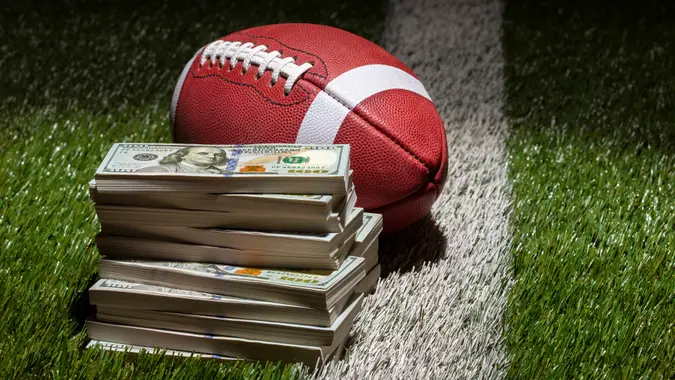6 Strategies To Build a Winning Investment Portfolio Using Fantasy Football Tactics

Commitment to Our Readers
GOBankingRates' editorial team is committed to bringing you unbiased reviews and information. We use data-driven methodologies to evaluate financial products and services - our reviews and ratings are not influenced by advertisers. You can read more about our editorial guidelines and our products and services review methodology.

20 Years
Helping You Live Richer

Reviewed
by Experts

Trusted by
Millions of Readers
A while back, I was trying to think of ways to explain how to build an investment portfolio, and it hit me–fantasy football. Now, before you click away thinking, “I’m not into sports,” hold on! I promise this is going to be a touchdown of an article, and you don’t need to be a football fanatic to appreciate it.
Fantasy football, for the uninitiated, is a scoring game based on an NFL player’s performance. Each player accumulates points based on their on-field productivity, like touchdowns, yards gained, or interceptions. It’s not so different from building an investment portfolio. Let’s dive into what a good investment playbook looks like.
‘Not Putting All Your Eggs in One Basket’ — Diversification
In fantasy football, you can’t stack your team with just quarterbacks or wide receivers. You need a diverse lineup, including running backs, tight ends and more. Similarly, diversification is key in investing.
Don’t put all your money into a single asset class. Spread your investments across different sectors, such as large-cap stocks, mid-cap stocks, small-cap stocks, international assets, and even bonds. Just as relying on one position in fantasy football can lead to a disastrous bye week scenario, overloading your portfolio with one type of asset can expose you to unnecessary risks.
See More: Here’s How Much a $1,000 Investment in Ford Stock 10 Years Ago Would Be Worth Today
‘Football Teams’ — The Role of Different Companies
In fantasy football, you don’t want your team to consist solely of players from one NFL team, even if you love them. Why? Because when that team has a bye week, your entire fantasy team is affected.
Investing works similarly. Different investment companies specialize in various aspects of the market. Some shine during market booms, while others excel in downturns. Just as you diversify your fantasy team by selecting players from different NFL teams, consider diversifying your investments across companies with varying strategies and specialties.
‘Drafting Players’ — Selecting Investments
Now, when it comes to selecting players in fantasy football, you choose players based on their performance rankings and historical data. When it comes to investments, you evaluate them in a similar way. Look at their past performance, but remember that past performance doesn’t guarantee future results.
Just as you wouldn’t pick a player who has consistently underperformed in fantasy football, avoid investments with a poor track record. Use resources like Morningstar to compare investments against their peers, similar to checking player rankings on fantasy football platforms.
‘Keeping Your Team in Top Form’ — Monitoring and Rebalancing
In fantasy football, you can’t just draft your team and forget about it. You must continually monitor players’ performance, make changes, and adjust your strategy throughout the season. Similarly, your investment portfolio requires ongoing attention.
Keep an eye on your investments, rebalance as needed, and make changes based on performance and market conditions.
‘Auto Draft’ — The Role of Target Date Funds
If you’ve opted for a target date fund, it’s like setting your fantasy football team on auto-draft. It adjusts your portfolio based on your age and risk tolerance. But just like auto-draft doesn’t guarantee the best fantasy team, a target date fund may not be the ideal choice for your investment needs. Periodic evaluation and adjustment are crucial.
‘Rookies and Free Agents’ — Embracing Risk
In both fantasy football and investing, you can opt for high-risk, high-reward options like rookies and free agents. These can be enticing but come with additional risks. Just as you wouldn’t want your entire fantasy team filled with unproven players, it’s unwise to allocate all your investments to high-risk assets. Strike a balance between stable investments and those with growth potential.
In the end, the art of building a successful fantasy football team and constructing a winning investment portfolio relies on strategy, diversity, evaluation and adaptability. While the outcomes are distinct, the principles are remarkably similar.
So, whether you’re a seasoned fantasy football player or just beginning to explore the world of investments, remember that mastering these realms requires a deep understanding, thoughtful planning, and a willingness to adapt to changing circumstances. Just as your fantasy football team strives for victory, your investment portfolio aims for financial success. Good luck in both of your ventures!
Editor’s note: The author, Connor Bauserman, is a senior financial advisor with Harbour Investments Inc. This article is for informational purposes only and not full financial advice. Consult with a qualified financial professional for personalized guidance.
 Written by
Written by  Edited by
Edited by 

























